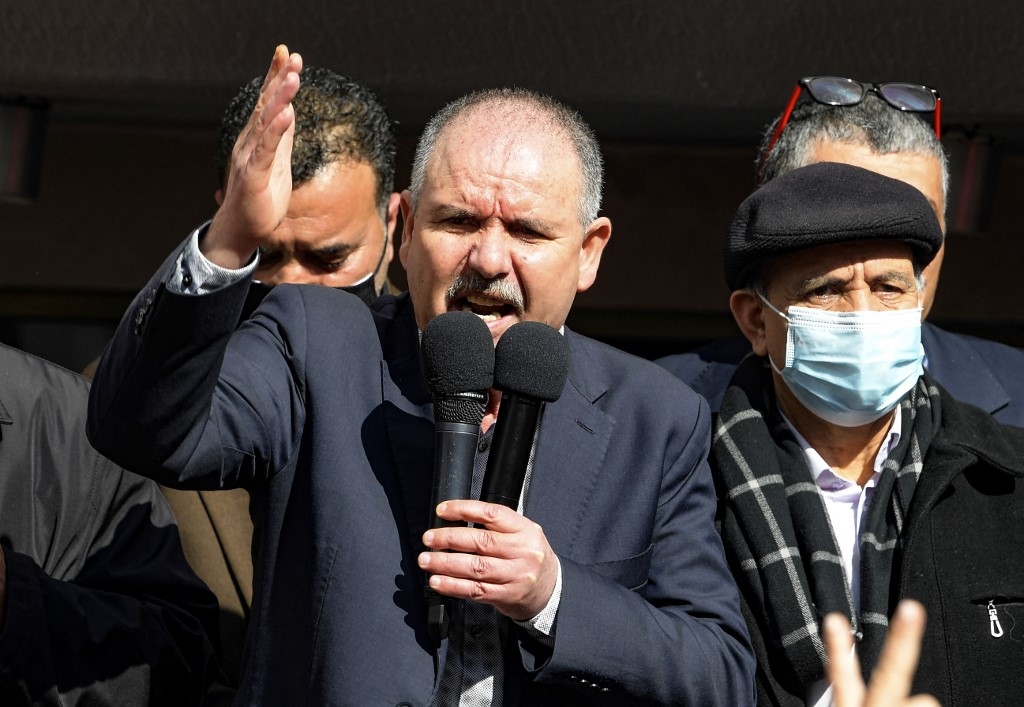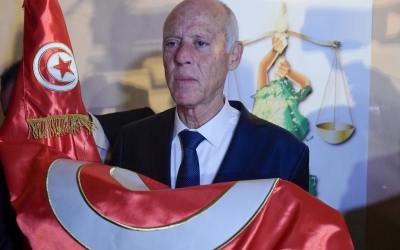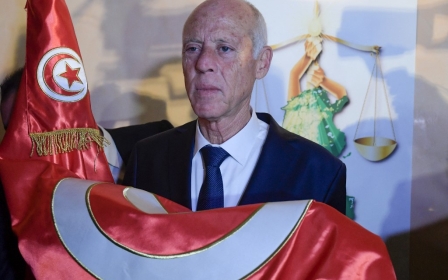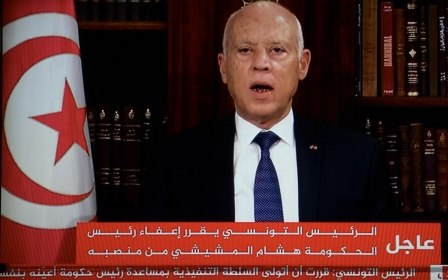Tunisia coup: Union official defends president's measures as parties denounce 'coup'

Tunisia’s largest workers union has refrained from denouncing the measures taken by President Kais Saied in its first official response to the sacking of the prime minister and freezing of parliament.
The reaction of the union came in contrast to that of most political parties which denounced the moves as a coup against the country's nascent democracy.
The powerful General Labour Union (UGTT), with more than one million members representing an estimated five percent of the Tunisian population, did not reject Saied's decisions, but rather emphasised “the need to adhere to constitutional legitimacy in any action taken at this stage”.
In a statement published on its official Facebook page, following a board meeting on Monday, the union also stressed the need “to ensure respect for the constitution, the continuation of the democratic path, the restoration of stability to the country and the restoration of its capacity for construction and progress.” It did not clearly declare its opposition or support for the president’s move.
Saied announced on Sunday that he was freezing parliament, suspending the immunity of all MPs, and dismissing Prime Minister Hicham Mechichi after protests rocked several Tunisian cities.
New MEE newsletter: Jerusalem Dispatch
Sign up to get the latest insights and analysis on Israel-Palestine, alongside Turkey Unpacked and other MEE newsletters
The president’s actions come two months after Middle East Eye revealed a letter written by Saied’s advisers urging him to seize control of the country using Article 80 of the constitution, which he now has.
On Sunday night, Saied said that he would now assume the presidency of the executive authority with the assistance of a new prime minister.
In response, Tunisian Parliament Speaker Rached Ghannouchi accused Saied of launching "a coup against the revolution and constitution".
"We consider the institutions to be still standing and supporters of Ennahda and the Tunisian people will defend the revolution," Ghannouchi, who heads the moderate Islamist party, added, raising the prospect of confrontations between supporters of his party and Saied.
Meanwhile, the assistant secretary-general of the UGTT told the local Shems FM news outlet that he believes the “majority of the president’s decisions are constitutional”.
The senior union official, Sami al-Tahiri, said that his organisation “had consulted some professors of constitutional law” and that there “was not much to criticise” about Saied’s measures.
“The situation is rotten, and the state and its apparatus are absent in the face of the coronavirus pandemic,” he was quoted by Shems as saying.
'Outright coup'
The UGTT's position comes as the largest political parties have declared their rejection of the president's move.
The Heart of Tunisia party and the Dignity Coalition condemned Said's decision, while the Democratic Current party, which previously supported Saied on many occasions, has rejected his decision to assume all powers.
In a statement on Monday, the Democratic Current held the Ennahda party and the Mechichi government responsible for “the legitimate popular tensions, the social, economic and health crisis, and the blockage of the political horizon.”

The Tunisian Workers' Party issued a statement saying that "what President Kais Saied did is a clear violation of the constitution, an anti-democratic measure, and the beginning of a coup d'etat."
Likewise, the Republican Party dismissed Saied’s decisions as "an outright coup against the constitution."
Meanwhile, the Independent High Electoral Commission, which has overseen elections since the 2011 revolution, declared its opposition to Saied’s decisions.
The head of the commission, Nabil Bafoun, said on Monday that Saied’s measures have created “a constitutional vacuum" and that they “do not comply with the provisions of the constitution". He noted that holding early elections in the country is “not possible” at the moment.
Saied's move came after a day of protests against the government and the biggest party in parliament, Ennahda, following a spike in Covid-19 cases and growing anger over chronic political dysfunction and economic malaise.
It poses the greatest challenge yet to Tunisia after its 2011 revolution that triggered the "Arab spring" and ousted an autocracy in favour of democratic rule.
Middle East Eye delivers independent and unrivalled coverage and analysis of the Middle East, North Africa and beyond. To learn more about republishing this content and the associated fees, please fill out this form. More about MEE can be found here.





